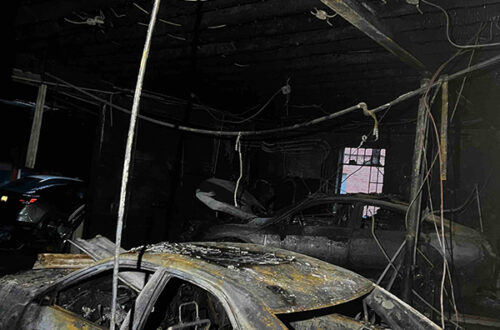
Mission Win-Win: Why U.S. Military Veterans Make Great Shop Employees
Published in AASP-MN News – Thomas Greco Publishing
Army. Navy. Air Force. Marines. Automotive and collision repair shops? At first glance, one of these things obviously does not belong in this list, but U.S. military veterans who have found a career in repair facilities just may offer a different perspective on the matter.
In honor of Veterans Day on November 11, AASP-MN News spoke with several local veterans about the similarities and differences between military and shop life, how military training lends itself to a successful repair career and what shops can expect when they hire a veteran.
Loyalty. Efficiency. An affinity for training. What employer wouldn’t gladly hire an employee who exhibited these traits? And those are just a few of the attributes that are typically bred into members of the U.S. military.
“Veterans are used to a lot of training, have a strong work ethic and work well with a team,” says Air Force veteran Jesse Jacobson (Heppner’s Auto Body; Woodbury). “They should be very organized, well-dressed, professional and punctual.”
Agreeing that organization is an important skill instilled by the military, Army veteran Greg Melartin (Matt’s Body Shop & Tires; Spring Valley) tacks on some additional thoughts: “The military teaches you to prioritize things and to work in an efficient manner. Veterans learn to move with purpose. They are also incredibly dedicated, and these are all things that help greatly in a shop environment.”
“Most who have served in the military are constantly learning, enjoy a structured routine and have a genuine desire to take care of people,” Josh Shaw (Shannon’s Auto Body; Brainerd), another Army veteran, contributes. “Repair shops repair cars, but we are in a business that takes care of people.”
Scott Miller (Collision Specialists Inc.; Austin), who served in the United States Marine Corps Reserve for six years and did two tours in Iraq, expresses the belief that “there is a lot that crosses over, especially attention to detail. Military daily work involves a lot of life-or-death situations; that’s what the military does. It trains every day for the day that they get called to war. So, all training and everything done in a normal military workday supports that. That weight of life-or-death decisions hits this industry every day.”
The dynamics of working in a shop certainly differ significantly from military life in many respects.
“The collision repair environment is fast paced as is the military; however, in a collision shop, we need to be able to adjust to rapidly changing technology advancements,” Shaw shares. “Don’t get me wrong…the military does as well. It is just a much more drawn-out process. Collision repair centers are process and SOP-driven, but those helping shape the organization, as well as those on the production floor, must be ready and willing to change as quickly as a new model is released or the OEM changes a procedure.”
Miller observes that the biggest difference to him was “The down time. The military is very similar to a light switch where either you are on or off, either going as fast as you can or waiting to go as fast as you can. I guess some shops are still like that, but the majority of them have learned not to be so on or off and are learning to smooth things out.”
“The lack of a specific rank structure makes things more relaxed,” Jacobson offers a similar perspective. “Employment flexibility is another. In the civilian world, employees can leave whenever they want or change careers whenever they want. In the military, you are under some sort of contract for a specific time and job. During that time, you operate under the needs of the military 24/7. Also, the military pay scale is very transparent; everyone knows what everyone else is earning along with benefits, so it takes that variable out of the workplace.”
To Melartin, one of the biggest differences relates to the fact that “you have a set baseline for soldiers in the military about how things are going to be, but that’s not the case with civilian employees. There’s no set baseline or basic training that everyone goes through. Another thing that’s incredibly different in the military is the adherence to rules and regulations. If someone in the military points out that a directive is a regulation or law, 99 percent of the time, it will be followed. In shops, we deal with insurance companies and adjusters who may adhere to a rule, regulation or policy 30 percent of the time. For military veterans, it can be incredibly frustrating when those rules are not followed.”
Of course, shop employees without a military background are often irked by that same refusal to follow guidelines, and veterans are apt to find that they enjoy working for those types of shops even more since many thrive on the consistency and clarity offered by written shop policies.
“An efficient shop runs on policies and procedures, and so does an efficient military unit,” Melartin points out.
“In a general sense, process drives success,” Shaw agrees. “In the military, there are standards, procedures and processes for nearly everything. If you adhere to what is defined, written and required, a large degree of success can be achieved. For most military personnel, their days are driven by standard operating procedures, which in turn is very similar to an organized and well-run collision shop.”
Another similarity between shops and the military lies in the relationships between team members, according to Jacobson. “In both environments, there’s a need for teamwork to get the job done. Everyone has a role to play in order to accomplish a task, and veterans understand that well. Also, constant training is required in both careers.”
Miller shares his personal experience as a means of further explaining why the comradery between shop employees is so important for military veterans. After returning from his second tour in Iraq and going to work for his father’s business, Miller describes himself as “messy. I acted like I was on leave and would be going back to Iraq. I was quite literally just fumbling along, spending money and partying like a rock star. I wasn’t taking my employment in my dad’s shop seriously until I was faced with a decision: get out or stay in. I chose to dive into the shop fully, and without having somewhere to go to complete my daily tasks, it would have taken much longer to process all the emotions tied to my military experience.
“Without that support system from all the guys in the shop, I’m not exactly sure where I would be,” he continues. “They taught me to slow down, live my life and enjoy it. I spent time with their families and went out with them on the weekends. They were my ‘Marine corps squad’ that weren’t Marines. We were tied together by our common goal (mission), which was to fix the cars in front of us and to do it right. They helped me transition back to civilian life. It’s so important: the comradery between personnel, especially when you have a workplace where everyone is engaged and working toward one common goal. If you can find that level of teamwork in a shop, the similarities to military life can get very close.”
With the current workforce shortage facing both automotive service and collision repair facilities, it simply makes sense for shops to explore the possibility of hiring military veterans.
“We must look everywhere we can in the current labor market,” Shaw stresses. “When conducting an interview or considering potential team members, there are a number of questions to consider: Can this person be trained? Are they a hard worker? Will they be loyal to your team? Does their previous experience relate to what you do? Veterans are a yes, yes, yes and yes. If there is a veteran looking for employment, please consider what they can bring to your organization in terms of leadership, teamwork, commitment, process development, SOP adherence and more. Remember: Uncle Sam spent a good deal of time and money training these folks on all those things!”
“Veterans are always looking for a purpose and want to serve the greater good,” Jacobson insists. “Our industry has a great purpose and mission. Whether its general repair or collision work, we are all about helping customers get their vehicles back on the road to the highest standard. It is a complex industry, and veterans are up for the challenge.”
“Hiring veterans for supportive roles, if they are not properly trained in collision repair, would be advantageous,” Miller suggests. “Attention to detail in parts management, mirror matching parts, detailing vehicles or even quality control managers all seem like good fits.”
With so many desirable skills and traits, Melartin warns shop owners, “Military people are in high demand because they do have that baseline skill set. Eighty percent of veterans are amazing, so if you can get a vet into your business, it’s going to help greatly. But they’re also in high demand in other industries, so until our wages increase and give them a better reason to pursue this field, it’s going to be difficult. Shops need to charge appropriately to be able to pay these sought-after employees. If you’re interested in hiring military veterans, I encourage you to reach out to local vet centers, VFWs, American Legions and even the National Guard Reserves.”
While there are obviously many benefits to hiring military veterans, shop owners and managers should also keep a few things in mind.
“Veterans are used to having a strong organizational structure, goals and values,” according to Jacobson. “Veterans also get a lot of training on how to be a professional. That includes what it means to be a leader and manager. Leadership principles are drilled into a veteran early on, and management training is added around four to five years of service. The training progression is very detailed and transparent, so shops should have a plan in place so veterans know how to get to the next skill level. Veterans are also very competitive; whether it’s physical training tests or promotion boards, veterans are always measuring themselves against their peers.
“The transition from military to civilian is a culture shock for most veterans, and it may be a difficult adjustment if a shop isn’t clear on those items,” Jacobson adds. “It takes time to understand how everything works, from payroll to benefits, healthcare, vacation, etc. It’s all standardized in the military, so it’s something veterans haven’t had to think much about. Providing resources to better understand these items would definitely help.”
“For the most part, if you tell a veteran how you want something done, that’s how they’re going to do it, but if you change your mind, that’s not going to sit well,” Melartin cautions. “If your policies don’t align with how things are actually done, it can be difficult for veterans to adapt.”
Miller reminds employers to “remember the light switch mentality. Military persons are used to making decisions and moving forward. Taking a while to progress in a project will often frustrate. It’s important to remember that military veterans are individuals, and it would be beneficial for employers to listen to their story to get a feel for those individual needs. I needed patience, which is what my team gave me, and that made all the difference.”
“Remember that they have not been doing this for 20 years,” Shaw urges. “What do they need to know? Are your SOPs clear and concise? What are your expectations, and are they clearly expressed? Alleviating any questions or concerns at hire can help the onboarding process overall. Finding that individual a mentor or someone that they can connect with and learn from at your shop is important for all new hires, but this is especially true when bringing in a military vet. Also keep in mind that they came from an organization where there was a clear path for advancement; most will come on board and expect the same wherever they end up employed. Something to keep in mind is that the Department of Veterans Affairs offers an on-the-job training payment to that veteran if they qualify, which may help offset the cost of training in a new hire.”
Hiring new employees always requires an investment, but shops that invest in military veterans are likely to see a high return on their investment.
“You could make an investment and take a chance on someone that served this country proudly for two, six, 10 or even 20 years, and with that, you will generally find loyalty to your shop or organization, someone who understands the benefits of teamwork, a leader who understands process and contributes to needed changes,” Shaw believes. “If you have the privilege of bringing someone into your organization who previously was committed enough to possibly give their life for their country, imagine the possibilities that could bring to your organization. Provide support and a quality culture and you will be rewarded with loyalty, dedication and new ways of looking at things.”
“Sure, you’re going to have to train them because they’re still human beings, but most veterans are more receptive to training than the typical civilian,” Melartin says. “And training is necessary in this field, so that willingness makes all our lives easier.”
Miller believes, “If you give the veteran a clear path in their job description, they’ll treat it as a goal, and having a ‘mission’ will motivate them to complete it in its entirety!”
“Veterans can provide great value to an organization because they have a diverse background, “Jacobson emphasizes. “They are asked to do a variety of things (needs of the military again), so they have many different experiences even outside of their primary job. I took a break from construction to do military funerals for four months. Veterans are also used to pressure situations. Some of these situations are artificial training exercises, and some are real-world experiences after being at war for 20-plus years.
“The last thing I’ll say is that veterans are all different,” he adds. “There is no cookie cutter example. We all served in different parts of the world, with different people, did different jobs and had different experiences. What we do have in common is that we all took oaths to serve and protect our country, even if it means sacrificing our lives.”
AASP-MN News would like to express gratitude to this month’s contributors and all U.S. military veterans for their service and protection. We salute you!




